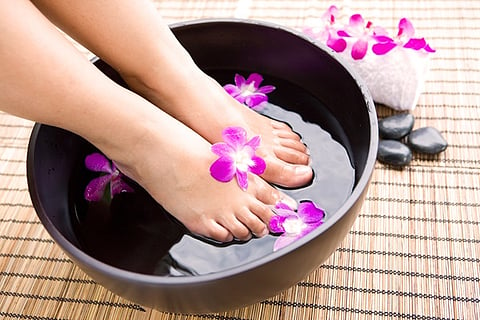
- Home
- About DiabetesAbout Diabetes
- Living with Diabetes
- Recipes & FoodRecipes & Food
- Previous Issues
- WellbeingWellbeing
- Contact Us
- FAQ

As a person living with Diabetes, one of the first things you're warned about is taking care of your feet. There's no big mystery about why, you will soon find out. High blood sugar over time can affect blood circulation that affects nerve endings and with the feet being the farthest part of your body, diabetic neuropathy has been a common affliction. And the onset of monsoons, especially in a mainly tropical country like India, adds to the need to keep your feet healthy. With moisture in the air and rain-soaked streets that can be a threat to your foot health, here are some tips you can use to keep infections away.
This may seem like an obvious rule of thumb but monsoons can be a challenging time. Do not venture outdoors barefoot. Even with your shoes on, moisture can make its way into the crevices of your nails and between your toes, turning your feet into a hotbed of fungi and bacteria. Wash your feet with lukewarm water and mild soap when you come back home from outdoors. Dry them with a soft towel, ensuring you clean your toes well too. Always pat dry your feet and avoid rubbing them vigorously to avoid cuts.
When you're living with Diabetes, choosing the right kind of footwear that keeps your feet covered and safe is vital. However, during the monsoons, there's the added need to ensure you pick out the best waterproof shoes that not only keep water at bay but also do not hurt your feet. Avoid opting for non- diabetic staple favorites like flip flops or crocs that can leave areas of your feet exposed and be the cause of infections or injuries. Try your footwear out before the monsoons kick in, to avoid any blisters. While looking for a pair that keeps your feet fully covered, make sure your footwear isn't too tight that cuts off circulation.
Unclean toenails can become crevices where infections grow. During the rainy season, especially, ensure your nails are trimmed and filed, avoiding the risk of hurting your feet with their sharpness. While cutting your nails, also ensure you clean out the corners and inside your nails so that any gunk hiding inside can be disposed of. Be careful to not injure yourself in the process; soak your feet for a few minutes in warm water first to help clean better. If you suspect having an ingrown nail or feel pain at any point in time, consult your doctor. The same holds true with any discolouration you may notice.
People living with Diabetes also suffer from dry and cracked skin very often, especially around their feet. These can often lead to discomfort, burning sensation, and eventually infections. Make sure you use a gentle, fragrance-free moisturizer after you wash and dry your feet every day. Dermatologists recommend diabetics use a cream or an ointment instead of a lotion to moisturize their skin, as those do a better job of healing dry skin. However, it's best to avoid over-moisturizing the areas between your toes, since they tend to dry slower and retain moisture, increasing the chance of contracting a fungal infection.
While diabetics must maintain their physical health by exercising regularly, it's best to avoid outdoor exercises during the monsoons. Even with good footwear on, the chances of slipping on mossy surfaces increase manifold during the monsoon season. Consider opting for workout regimes that include indoor walking or running, yoga, stretching, and muscle-building activities for the season instead.
Conduct daily inspections of your feet to be aware of any cuts or bumps. Check between your toenails and the bottom of your feet as well. Address smaller injuries and cuts immediately with an antiseptic solution and keep the area dry.
If you believe an injury isn't healing too well, notice an abnormality, or have a pre-existing neuropathy condition, contact your doctor immediately to avoid further complications. Caring for your feet should be second nature to all of us no matter the type of Diabetes but the rainy season is when you need to be doubly vigilant of podiatric healthcare. Happy monsoons!
